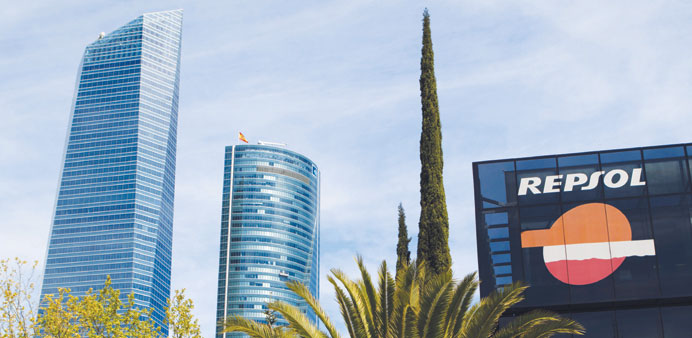A logo sits on display outside the Repsol headquarters in Madrid. Letting Repsol drill about 64km off Lanzarote and Fuerteventura islands shows the resolve of Prime Minister Mariano Rajoy to revive domestic energy exploration after decades of decline.
Bloomberg
Repsol won government approval to start a $10bn oil drilling project off Spain’s Canary Islands, signalling success in its 12-year campaign to start exploration near the Atlantic archipelago.
Spain’s environment ministry cleared the plan with conditions, Deputy Minister Federico Ramos said in a briefing on Thursday.
The decision follows a reconfirmation in 2012 of an exploration licence first awarded in 2001 and later tied up in court battles.
The decision advances plans by Spain’s largest oil company to hunt for fields in an area geologists estimate may be able to supply about 10% of national demand.
Letting Repsol drill about 64km (40 miles) off Lanzarote and Fuerteventura islands, where political leaders oppose the project for fear of harming the environment and tourist industry, shows the resolve of Prime Minister Mariano Rajoy to revive domestic energy exploration after decades of decline.
Several hurdles remain for Repsol. The Supreme Court is set to rule June 10 on a challenge to its exploration permit. Repsol shares rose 1% in US trading after the news and yesterday in Madrid climbed 0.4% to €20.655.
Central to the review was whether there are enough safeguards to stop an oil spill. That’s of heightened concern after the Macondo disaster in the US Gulf of Mexico The volcanic islands’ beaches, nature reserves and clear waters off Africa make them a top draw for tourists to Spain, the world’s most-visited nation after the US and France. The ministry said it’s demanding the most sophisticated safeguards available.
“We’ve had 267 tests in Spain and never has there been an accident,” Ramos said at the briefing, referring to offshore exploration wells done over the years. Most showed poor results.
Spain buys about 99% of its oil and natural gas abroad — among the highest proportions in Europe. That’s the biggest import cost for an economy emerging slowly from a six-year economic slump.
The central government’s support for offshore and shale prospecting has collided with an environmental protection movement that enjoys decades-old backing from many local governments and conservationists.
“Today’s ruling shows that the activities we are proposing are compatible with respect for the environment,” Repsol spokesman Kristian Rix said in Madrid after the decision. The study cost more than €4mn ($5.4mn).
Spain is considering opening areas for hydraulic fracturing, known as fracking, or conventional exploration from the Mediterranean waters off Majorca island to the emerald Valley of Pas in the north. This pits a tourism industry that draws 61mn visitors a year and generates 11% of gross domestic product against the administration’s goal to bring down a 25% jobless rate.
The Canaries regional government joined with Fuerteventura and Lanzarote and environmentalists in a court challenge to the legality of Repsol’s exploration permit, granted in 2012 a few months after Rajoy was elected.
That’s when his Popular Party-led national government agreed to confirm, with some changes, Repsol’s 2001 permit. The 11-year-old authorisation had been frozen after earlier legal battles also went all the way to the Supreme Court. “We have little to gain and a lot to lose,” said Mario Cabrera, president of the local government of Fuerteventura, one of the closest islands to the prospects, whose dramatic cliffs and remote beaches helped win it a designation as a Unesco biosphere reserve in 2009. “Tourism needs a clean sea,” he said in e-mailed remarks.
Repsol forecasts it will produce as much as 110,000 barrels a day should the prospect deliver its expected reserves of 900mn to 2.2bn barrels. That dwarfs today’s biggest domestic well in Spain, also run by Repsol, off Tarragona in the Mediterranean. It pumps about 9,000 barrels a day.
The ministry approved Repsol to drill three test wells in waters about 800 metres (1/2 mile) deep. Then it can perforate further into the ocean floor about 2,300 metres in two of the sites, and 5,000 metres in the other.
Should Repsol discover enough oil, it will need an additional permit for production and another environmental clearance, before starting the full drilling programme, which the company estimates will cost €7.5bn ($10bn).

